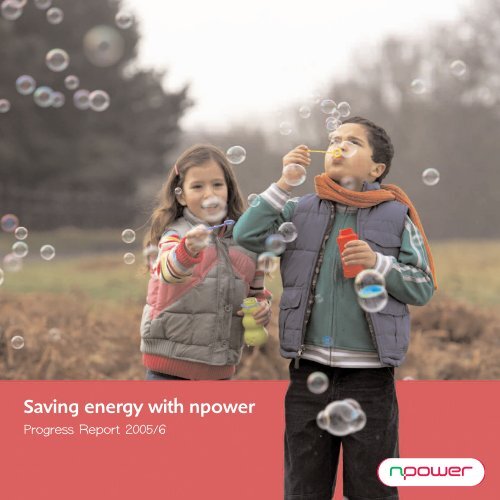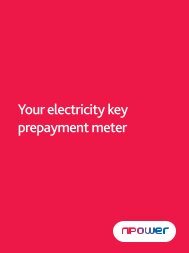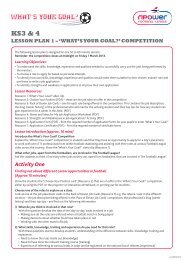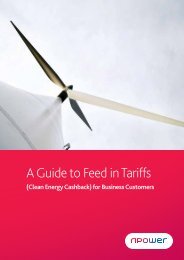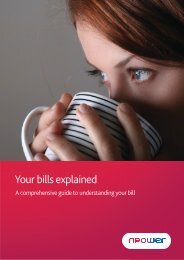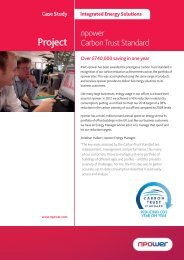Saving energy with npower
Saving energy with npower
Saving energy with npower
Create successful ePaper yourself
Turn your PDF publications into a flip-book with our unique Google optimized e-Paper software.
<strong>Saving</strong> <strong>energy</strong> <strong>with</strong> <strong>npower</strong><br />
Progress Report 2005/6
“ ”<br />
As the evidence mounts to show how much our<br />
climate is changing…there is growing concensus<br />
that action is needed and?needed urgently.<br />
2
Contents<br />
Introduction page 4<br />
Energy savings from <strong>npower</strong> at a glance page 5<br />
<strong>npower</strong> consumer products and services page 6<br />
<strong>npower</strong> in the community page 10<br />
Looking ahead page 12<br />
Top tips and further information on how to save <strong>energy</strong> page 14<br />
What is the Energy Efficiency Commitment? page 15<br />
3
Introduction<br />
“It seems that hardly a day goes by <strong>with</strong>out the environment and specifically<br />
climate change being mentioned either by politicians or on the news. This to me<br />
shows just how serious the issue has become and how far it has moved up the<br />
political agenda in recent years. As the evidence mounts to show how much our<br />
climate is changing and could change further in the future, there is growing<br />
consensus that action is needed and needed urgently.<br />
As one of the UK’s leading <strong>energy</strong> suppliers and a responsible organisation,<br />
<strong>npower</strong> has a part to play in helping tackle climate change and reducing the key<br />
contributory factor, principally the growth in carbon emissions. We are engaged<br />
in this in a number of ways: by supplying more renewable <strong>energy</strong> to the grid,<br />
reducing the <strong>energy</strong> we use running our own business and operations and by<br />
delivering <strong>energy</strong> savings to consumers.<br />
It is the latter of these which is the focus of this report. This is our first progress<br />
report under the second Energy Efficiency Commitment (2005 to 2008) and<br />
sets out how we are doing against our targets to deliver <strong>energy</strong> savings to<br />
households through a variety of initiatives across Great Britain. It is also full of<br />
handy hints and tips to help any householder save <strong>energy</strong>, save money and do<br />
something positive <strong>with</strong> regards the environment in which we all live.<br />
More information on the Energy Efficiency Commitment, together <strong>with</strong> a<br />
summary of <strong>npower</strong>'s year one progress are available at the end of this<br />
report. Whether you are a householder, <strong>npower</strong> customer or stakeholder,<br />
I trust you will find this report an informative summary of what we are<br />
doing and how we are making a real difference.”<br />
David Threlfall<br />
CEO - <strong>npower</strong> Retail<br />
4
Energy savings from <strong>npower</strong> at a glance<br />
Between April 2005 and March 2006, <strong>npower</strong> directly<br />
contributed towards providing over 1.5 million <strong>energy</strong> saving<br />
measures to householders throughout Great Britain. This<br />
equates to saving over 1.2 million tonnes of carbon - that would<br />
otherwise have been released into the atmosphere over the<br />
lifetime of the measures installed.<br />
That’s equivalent to the weight of over 240,000 elephants or<br />
enough carbon dioxide to fill over 7 million double decker buses!<br />
Insulation<br />
53%<br />
Lighting<br />
1%<br />
Appliances<br />
6%<br />
Heating & CHP<br />
EEC1<br />
3% Carry-over<br />
37%<br />
We did this in a number of ways through a range of initiatives in<br />
the private and public sectors. The pie chart shows a summary<br />
of our portfolio of <strong>energy</strong> saving measures.<br />
In addition to the clear environmental benefits of what we’re<br />
doing to reduce carbon emissions, a key part of our programme<br />
is to deliver <strong>energy</strong> savings to those who need it most.<br />
At least 50% of the <strong>energy</strong> savings we deliver are to people on<br />
certain income related benefits and tax credits or consumers<br />
termed as ‘Priority Group’ customers. It’s vital we help these<br />
customers as their <strong>energy</strong> bills represent a significant chunk of<br />
their household income. Where we can, we’re also offering<br />
assistance to try to make homes warmer, aiming to stop the<br />
winter months becoming a time of real hardship. Many of these<br />
measures are delivered free of charge.<br />
This report sets out what we’re doing and where we’re making a<br />
difference. You’ll find details on the services we offer aimed<br />
directly at the end consumer, as well as information on our<br />
<strong>energy</strong> saving activity in the community.<br />
How <strong>npower</strong> delivered 1.2 million tonnes of carbon savings in 2005/6<br />
“ ”<br />
<strong>npower</strong> has a part to play in helping tackle<br />
climate change and reducing the key contributory<br />
factor, principally the growth in carbon emissions.<br />
5
<strong>npower</strong> consumer products<br />
and services<br />
<strong>Saving</strong> <strong>energy</strong> through<br />
insulation measures<br />
Imagine being able to throw a thick<br />
overcoat around your house? Well you<br />
can! The good news is that cavity wall and<br />
loft insulation can be installed easily and<br />
quickly and is relatively inexpensive.<br />
Insulation remains a key part of any effort<br />
to reduce <strong>energy</strong> usage. Nearly 60%<br />
of heat in the home is lost through the<br />
roof and walls where there is inadequate<br />
insulation. If you’re serious about saving<br />
<strong>energy</strong>, saving money and doing your bit<br />
for the environment, the right place to<br />
start is improving the insulation of<br />
your home.<br />
Professionally installed insulation<br />
<strong>npower</strong> have been working <strong>with</strong> the<br />
InstaFibre Consortium and its network<br />
of home insulation contractors for<br />
over four years, helping more customers<br />
benefit from professionally installed cavity<br />
wall and loft insulation.<br />
In fact, during the report period (2005/06)<br />
we have completed over 75,000 cavity<br />
wall and loft installations. If the loft<br />
insulation material we helped supply<br />
during this period was rolled out end to<br />
end it would easily stretch from Lands End<br />
to John O'Groats!<br />
DIY insulation<br />
Loft insulation,<br />
whether starting from<br />
scratch or ‘toppingup’,<br />
can be carried out<br />
by any DIY enthusiast.<br />
<strong>npower</strong> works <strong>with</strong><br />
Homebase to promote<br />
the benefits of loft<br />
insulation through their stores<br />
and ‘ideas’ magazine.<br />
Did you<br />
know?<br />
• By installing loft insulation to a<br />
depth of at least 270mm (10"),<br />
you could save up to 25% of your<br />
heating costs.<br />
• Uninsulated cavity walls cost<br />
you money. Up to 33% of heat<br />
produced in your home is lost<br />
through the walls. The cost of<br />
cavity wall insulation can be<br />
recovered in under two years, and<br />
the ongoing savings can be as<br />
much as £130-£160 each year.<br />
• If everyone installed cavity wall<br />
insulation, we'd cut carbon<br />
dioxide emissions by over 6.8<br />
million tonnes - enough to fill<br />
over 1.3 million hot air balloons.<br />
• If everyone installed 270mm loft<br />
insulation we'd save enough<br />
money to pay the <strong>energy</strong> bills of<br />
775,000 families for a year.<br />
• If everyone put an insulation<br />
jacket on their hot water tank,<br />
we'd cut carbon dioxide emissions<br />
by 670,000 tonnes - enough to fill<br />
around 134,000 hot air balloons.<br />
“ ”<br />
Insulation measures supported by <strong>npower</strong> have<br />
saved over 1 million lifetime tonnes of carbon.<br />
That’s the weight of 7 million adult men!<br />
6
Better heating<br />
Boilers account for around 60% of all<br />
domestic carbon dioxide emissions.<br />
Using a high efficiency boiler <strong>with</strong><br />
heating controls could save you<br />
between £190 and £240 a year, and<br />
significantly cut your home's carbon<br />
dioxide emissions.<br />
to purchase and install these items,<br />
which in turn helps households reduce<br />
their running costs.<br />
During the lifetime of their new boiler<br />
each customer will be reducing their<br />
carbon dioxide emissions by 2.7 tonnes.<br />
This is equivalent to the carbon dioxide<br />
released by heating enough hot water<br />
to make 454,000 cups of tea. So far<br />
over 25,000 A-rated boilers have been<br />
sold through the scheme. That’s around<br />
11 billion cups of tea! †<br />
friendly heating and hot water for your<br />
home and can generate up to 75% of<br />
your household <strong>energy</strong> requirement from<br />
the ground around you.<br />
<strong>npower</strong> is working <strong>with</strong> ICE Energy to<br />
promote the sale of ground source heat<br />
pumps to householders. Customers can<br />
receive grants of up to £1,500 to help<br />
support the cost of installing a ground<br />
source heat pump in their home.<br />
Many customers rely upon their installers<br />
for good advice when investing in a new<br />
heating system. In a recent customer<br />
survey we found that 76% of customers<br />
select their boiler on the installer's<br />
recommendation.<br />
As part of our commitment to helping<br />
customers save <strong>energy</strong> in their homes,<br />
<strong>npower</strong> is working <strong>with</strong> numerous<br />
companies from the heating industry to<br />
promote <strong>energy</strong> saving heating<br />
components, such as ‘A’ rated boilers and<br />
heating controls. The initiative, known as<br />
A1-Boilers, encourages heating installers<br />
In 2004 A1-Boilers won the H&V News<br />
Award for ‘Environmental Initiative of<br />
the Year’.<br />
Ground source heat pumps<br />
In addition to the more traditional heating<br />
products, <strong>npower</strong> is also promoting new<br />
environmentally friendly technologies as<br />
a means of encouraging customers to<br />
save <strong>energy</strong>. Ground source heat pumps<br />
use the solar <strong>energy</strong> stored in the earth<br />
to provide clean and environmentally<br />
Did you<br />
know?<br />
If everyone in the UK <strong>with</strong> gas central<br />
heating installed a high efficiency boiler,<br />
we’d save enough <strong>energy</strong> to heat<br />
3.7 million homes for a year.<br />
Heating products supported by <strong>npower</strong> have<br />
saved over 18,000 lifetime tonnes of carbon.<br />
That’s equivalent to the power used by<br />
“over 1.3 million televisions per year!<br />
”<br />
7
Energy efficient appliances and lighting<br />
Around 25% of the UK's total electricity is used to power lighting and<br />
appliances in the home. If we do nothing, this domestic use is predicted to<br />
rise by 20% by 2020 as an increasing number of <strong>energy</strong> using<br />
technologies (such as games consoles and set-top boxes) become more<br />
widely used 1 .<br />
<strong>npower</strong> works <strong>with</strong> a number of high street retailers to promote a range of<br />
<strong>energy</strong> efficient household appliances and lighting products. Anyone<br />
buying a new appliance should look out for competitively priced <strong>energy</strong><br />
efficient models. <strong>npower</strong> supports a wide range of activity to encourage<br />
customers to select a more <strong>energy</strong> efficient option. Consumers could<br />
benefit from lower fuel bills during the lifetime of the appliance and a<br />
growing number of <strong>energy</strong> efficient or A and A+ rated household<br />
appliances means you won’t compromise on features and functions.<br />
Case study<br />
Argos and Homebase<br />
<strong>npower</strong> works <strong>with</strong> Argos<br />
and Homebase to encourage<br />
customers to purchase more<br />
<strong>energy</strong> efficient options<br />
when investing in new<br />
household appliances. This<br />
includes a range of laundry,<br />
refrigeration, dishwashers<br />
and lighting products.<br />
As part of our ongoing commitment to promote the<br />
benefits of saving <strong>energy</strong> in the home, the <strong>npower</strong> orbs<br />
have stepped in to help signpost customers to <strong>energy</strong><br />
efficient appliances.<br />
Case study<br />
<strong>npower</strong> and Comet<br />
<strong>npower</strong> and Comet work together to promote the take-up of a range of<br />
<strong>energy</strong> efficient household appliances. We aim to encourage customers to<br />
purchase more <strong>energy</strong> efficient appliances through a range of promotional<br />
activity, including in-store activity and press advertisements.<br />
“ ”<br />
1 The Energy Challenge, Energy Review Report 2006, Department of Trade and Industry<br />
<strong>npower</strong>'s retail partnerships have saved 125,000<br />
lifetime tonnes of carbon. That’s enough carbon<br />
dioxide to fill 49,000 hot air balloons!<br />
8
How do I know the product I am<br />
buying is <strong>energy</strong> efficient?<br />
The EU <strong>energy</strong> label will help identify the<br />
most <strong>energy</strong> efficient models on a range of<br />
laundry and refrigeration appliances,<br />
dishwashers and electric ovens. The EU<br />
Energy Label rates products from A (the most<br />
<strong>energy</strong> efficient) to G (the least <strong>energy</strong><br />
efficient). Refrigeration appliances now have<br />
A+ and A++ rating to help identify the most<br />
efficient products.<br />
By law, the label must be included on all new<br />
refrigeration and laundry appliances,<br />
dishwashers, lighting and electric ovens.<br />
Did you<br />
know?<br />
• Buying a single <strong>energy</strong> efficient<br />
light bulb could save you up to<br />
£9 a year on your <strong>energy</strong> bills<br />
compared to a typical 100W bulb.<br />
• The average household wastes<br />
£37 each year by leaving<br />
appliances on standby.<br />
Every year TVs in the UK use<br />
£116 million worth of electricity<br />
just waiting to be switched on.<br />
How much money could an <strong>energy</strong> efficient appliance<br />
save me?<br />
EU Energy Rating<br />
<strong>Saving</strong> per year<br />
Fridge Freezer A+ or A++ up to £45<br />
Upright/Chest Freezer A+ or A++ up to £35<br />
Refrigerator A+ or A++ up to £20<br />
Washing Machine A up to £10<br />
Dishwasher A up to £20<br />
9
<strong>npower</strong> in the community<br />
<strong>npower</strong>'s community based projects aim<br />
to make homes warmer and more <strong>energy</strong><br />
efficient. We work through initiatives <strong>with</strong><br />
numerous local authorities and regional<br />
stakeholders - either as part of social<br />
housing improvement projects or<br />
specially created activities focused on a<br />
particular region. Together, <strong>npower</strong> and<br />
our partners deliver a range of <strong>energy</strong><br />
saving improvements, including home<br />
insulation and <strong>energy</strong> efficient heating.<br />
Through our community activity, over<br />
60,000 <strong>energy</strong> saving measures have<br />
been installed in homes throughout Great<br />
Britain, supported by <strong>npower</strong>.<br />
<strong>npower</strong>’s regional activity focuses on<br />
certain regions where help is most<br />
needed. Our partnerships <strong>with</strong> Warm<br />
Zones and Warm Wales, in conjunction<br />
<strong>with</strong> a number of local authorities and<br />
regional stakeholders, help to identify the<br />
needs of each individual household <strong>with</strong>in<br />
a specific region - quite literally door to<br />
door and street to street. Assistance is<br />
then provided using local contractors to<br />
make the appropriate improvements to<br />
homes, be it through improved insulation,<br />
heating or lighting. Those most in need,<br />
including Priority Group and fuel poor 2<br />
households, receive improvements at little<br />
or no cost.<br />
A key strength of our regional activity is<br />
that as well as saving households money<br />
by reducing fuel bills, it also helps to<br />
identify where benefit entitlement is not<br />
being claimed, therefore bolstering the<br />
income of many vulnerable households.<br />
In addition, advice is offered to<br />
households to help them reduce their<br />
<strong>energy</strong> usage through simple low or no<br />
cost behavioural changes.<br />
There are clear links between fuel poverty<br />
and poor health, not only amongst elderly<br />
households but also young families. Our<br />
work in these regions is alleviating real<br />
suffering particularly during the winter<br />
Neath/<br />
Port Talbot<br />
Wrexham<br />
<strong>npower</strong>’s regional activity<br />
Northumberland<br />
Hull<br />
months when household expenditure is<br />
stretched. Despite declining numbers of<br />
fuel poor households in recent years, the<br />
onset of rising fuel bills means that our<br />
action will remain of critical importance<br />
going forward.<br />
“<br />
A key part of our programme is to deliver<br />
<strong>energy</strong> savings to those who need it most.<br />
”2 Someone is deemed to be in fuel poverty if 10% or more of their income goes on home fuel bills.<br />
10
Case study<br />
Warm Wales<br />
<strong>npower</strong> is working in partnership <strong>with</strong> National Grid and<br />
other stakeholders, to improve the lives of thousands of<br />
householders in Wales. The initiative, delivered through a<br />
partnership <strong>with</strong> Warm Wales – Cymru Gynnes Cwmni<br />
Buddiant Cymunedol, is working to reduce the number of<br />
homes in fuel poverty 2 and improve the <strong>energy</strong> efficiency<br />
of all properties in local authority areas. Warm Wales is<br />
currently operating <strong>with</strong> two local authority partners -<br />
Neath Port Talbot and Wrexham. The project adopts a<br />
comprehensive and systematic approach, visiting and<br />
assessing all households <strong>with</strong>in a local authority area.<br />
It aims to offer every household, regardless of income,<br />
help to make their property more <strong>energy</strong> efficient and,<br />
in addition, help identify whether new or additional<br />
benefit payments are available.<br />
During the period April 2005 to March 2006, over 25,000<br />
measures were installed in homes across Neath Port<br />
Talbot and Wrexham.<br />
,<br />
In 2006, the Warm Wales partnership was awarded a Big<br />
Tick in the Power in Partnership category at the Business<br />
In the Community (BITC) Awards for Excellence.<br />
Case study<br />
Darlington Borough Council<br />
During the first year of EEC 2005 to 2008, <strong>npower</strong>, in<br />
partnership <strong>with</strong> Darlington Borough Council, successfully<br />
delivered a unique private sector insulation scheme aimed<br />
at providing whole house <strong>energy</strong> saving solutions. The Darlington £109<br />
scheme offered private sector residents cavity wall and loft insulation for a<br />
combined price of £109.<br />
Part funded by both the council and <strong>npower</strong>, the project delivered<br />
whole house insulation for over 1,100 properties, installing over 1,900<br />
measures and attracting a total investment in <strong>energy</strong> saving measures in<br />
excess of £650,000.<br />
"To significantly improve <strong>energy</strong> efficiency in over 1,100 properties throughout<br />
the borough is fantastic. Residents are subsequently seeing a reduction in<br />
their <strong>energy</strong> bills and increased comfort levels, whilst doing their bit for the<br />
environment too. It makes sense to fully insulate a property during one visit<br />
and we are delighted <strong>with</strong> the results this unique approach has delivered."<br />
David Burrell, Darlington Borough Council<br />
Case study<br />
Rotherham District Heating<br />
<strong>npower</strong> has provided funding towards a<br />
number of district heating projects as part<br />
of our community <strong>energy</strong> saving activity.<br />
Working in partnership <strong>with</strong> Rotherham Metropolitan Borough Council<br />
(MBC), a total of four coal fired district heating boiler plants were given<br />
funding to make replacements <strong>with</strong> new <strong>energy</strong> efficient gas boilers.<br />
The four district heating boiler plants serve a total of 275 Priority Group<br />
households in Rotherham, who will all now benefit from total fuel savings<br />
of almost £1 million and lifetime carbon savings of 6,200 tonnes. Other<br />
benefits also include increased reliability, a cleaner environment resulting<br />
from no coal deliveries, and significantly lower maintenance costs for<br />
Rotherham MBC.<br />
11
Looking ahead<br />
The provision of innovative and cost effective <strong>energy</strong> savings<br />
products has become a key part of <strong>npower</strong>’s business. Tackling<br />
climate change, saving <strong>energy</strong> and protecting vulnerable groups<br />
in society are long-term issues and <strong>npower</strong> is committed to<br />
playing its part.<br />
<strong>npower</strong> believes the Energy Efficiency Commitment should<br />
be about tackling climate change in its broadest sense,<br />
including helping to manage <strong>energy</strong> demand and not just<br />
<strong>energy</strong> efficiency.<br />
<strong>npower</strong> is looking to develop a number of new innovative<br />
<strong>energy</strong> savings products over the coming years and is asking<br />
the Government to allow greater innovation and flexibility to<br />
bring these measures to market under the third Energy<br />
Efficiency Commitment starting in 2008.<br />
12
In the next five to ten years you could see these<br />
<strong>energy</strong> saving products in your home!<br />
Smart meters:<br />
This term describes a new generation of metering that could<br />
provide a range of additional capabilities to help customers<br />
manage their <strong>energy</strong> usage more effectively. For instance,<br />
<strong>energy</strong> consumption information could be sent directly to<br />
your <strong>energy</strong> supplier, which means that manual meter readings<br />
or estimated bills could be a thing of the past. The displays<br />
may show <strong>energy</strong> usage in monetary terms rather than<br />
kilowatt-hours, highlighting the relevance of consumption.<br />
They could even enable you to monitor in detail the <strong>energy</strong><br />
used in your home and where it’s being wasted - for instance<br />
standby consumption.<br />
Domestic combined heat and power (CHP):<br />
Domestic CHP is a highly efficient way of generating your own<br />
heat and power simultaneously - a bit like having a mini power<br />
station in your home. The heat generated in the production of<br />
electricity is used to provide some of your heating needs (hot<br />
water and central heating). Customers may even be able to sell<br />
the excess electricity generated back to their <strong>energy</strong> supplier!<br />
Mini wind turbines:<br />
Your very own mini wind turbine could generate a proportion of<br />
your household <strong>energy</strong> needs from an entirely clean and<br />
renewable <strong>energy</strong> source.<br />
Solar water heating:<br />
These systems use heat from the sun to work alongside<br />
your conventional boiler to heat your water. It’s estimated that<br />
the most efficient systems can provide almost all of your hot<br />
water requirements during summer months and up to 50%<br />
during the winter.<br />
Solar photovoltaic (PV):<br />
Solar PV enables you to generate your own electricity using the<br />
heat from the sun, thus helping to meet some of your household<br />
<strong>energy</strong> requirements. PV panels come in a wide range of colours<br />
and sizes so could provide an attractive alternative to<br />
conventional roof tiles!<br />
13
Top tips and further information<br />
on how to save <strong>energy</strong><br />
What can I do today<br />
to save <strong>energy</strong>?<br />
1. Close your curtains at dusk to stop heat escaping.<br />
2. Reduce your thermostat by one degree - it could cut<br />
up to 10% off your <strong>energy</strong> bills.<br />
3. Use your dishwasher or washing machine more<br />
effectively - wait for a full load before you start<br />
the cycle, or use an economy setting if your machine<br />
has one.<br />
4. Wherever possible, don't leave your appliances on<br />
standby - households in the UK now spend around<br />
10% of their electricity bill on standby power.<br />
Further information<br />
For more information on how you could save <strong>energy</strong><br />
go to www.<strong>npower</strong>.com<br />
Other useful web sites include:<br />
The British Wind Energy Association: www.bwea.com<br />
Centre for Alternative Technology: www.cat.org.uk<br />
Energy <strong>Saving</strong> Trust: www.est.org.uk<br />
National Energy Action: www.nea.org.uk<br />
The Solar Trade Association: www.green<strong>energy</strong>.org.uk<br />
5. Only boil as much water as you need. If everyone<br />
boiled only the water they needed to make a cup of<br />
tea instead of filling the kettle every time, we could<br />
save enough electricity in a year to run nearly half of<br />
the street lighting in the country.<br />
14
What is the<br />
Energy Efficiency Commitment?<br />
The Energy Efficiency Commitment<br />
2005 -2008 (EEC2) forms part of the<br />
Government’s Climate Change Programme<br />
and Fuel Poverty Strategy. EEC2 requires<br />
electricity and gas suppliers to achieve<br />
targets for delivering <strong>energy</strong> savings in<br />
domestic properties in Great Britain. The<br />
overall target of 130TWh was set by Defra. 3<br />
Each licensed <strong>energy</strong> supplier group <strong>with</strong><br />
at least 50,000 gas or electricity domestic<br />
consumers is subject to an individual<br />
target. Ofgem 4 are responsible for<br />
apportioning the overall target in relation<br />
to each supplier’s domestic consumer<br />
numbers. At least half of the target must<br />
be achieved <strong>with</strong>in the Priority Group,<br />
households receiving certain income<br />
related benefits and tax credits, to ensure<br />
that this group receive a significant share<br />
of the benefits of EEC2.<br />
<strong>npower</strong>'s Year 1 Performance (March 2005 - April 2006)<br />
% of <strong>energy</strong> saving target achieved<br />
120<br />
100<br />
80<br />
60<br />
40<br />
20<br />
0<br />
Apr-05<br />
Oct-05<br />
Total<br />
42%<br />
Year 1<br />
Apr-06<br />
EEC (2005 - 2008)<br />
Year 1 Performance<br />
Oct-06<br />
Year 2 Year 3<br />
Apr-07<br />
Oct-07<br />
Apr-08<br />
3 Defra: Department for Environment, Food and Rural Affairs (www.defra.gov.uk)<br />
4 Ofgem: The Office of Gas and Electricity Markets - the regulator for Britain's gas and electricity industries (www.ofgem.gov.uk)<br />
Notes: All carbon savings calculated using the OFGEM EEC2 methodology.<br />
All carbon saving equivalents taken from the Energy <strong>Saving</strong> Trust <strong>energy</strong> calculator. To view this calculator go to www.est.org.uk<br />
All <strong>energy</strong> saving facts take on from the Energy <strong>Saving</strong> Trust 2006 unless otherwise stated.<br />
† Comparison <strong>with</strong> a SEDBUK B-rated boiler, saving 940kWh/annum, over a 15 year life span of the boiler.<br />
15
<strong>npower</strong> is a registered trademark and the trading name of Npower Limited (registered in England and Wales No. 3653277) and associated companies.<br />
Registered office: Windmill Hill Business Park, Whitehill Way, Swindon SN5 6PB<br />
npm3998/09.06


